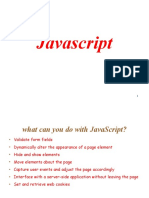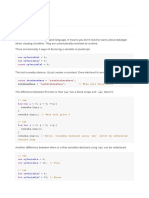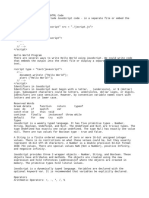JavaScript Basics
1
What is JavaScript?
From Wikipedia:
... high-level, dynamic, untyped, and interpreted programming language
... is prototype-based with first-class functions, …
... supporting object-oriented, imperative, and functional programming
... has an API for working with text, arrays, dates and regular expressions
● Not particularly similar to Java: More like C crossed with Self/Scheme
○ C-like statements with everything objects, closures, garbage collection, etc.
● Also known as ECMAScript
2
Some thoughts about JavaScript
● Example of a scripting language
○ Interpreted, less declaring of things, just use them (popular today: e.g. python)
● Seems like it was designed in a rush
○ Some “Good Parts”, some not so good
○ Got a bad reputation
● Many programmers use a subset that avoids some common problems
● "use strict"; tweaks language to avoid some problematic parts
● Language being extended to enhance things: New ECMAScript every year!
○ Transpiling common so new features used: e.g ECMAScript Version N, TypeScript
● Code quality checkers (e.g. jslint, jshint, eslint) widely used
3
Good news if you know C - JavaScript is similar
i = 3; if (i < 3) {
i = foobar(i);
i = i * 10 + 3 + (i / 10); } else {
while (i >= 0) { sum i = i * .02;
+= i*i; i--; // Comment }
}
Most C operators work:
* / % + - ! >= <= > < && || ?:
for (i = 0; i < 10; i++) { function foobar(i) { return i;}
} continue/break/return
/* this is a comment */
4
JavaScript has dynamic typing
var i; // Need to define variable ('use strict';), note: untyped
typeof i == 'undefined' // It does have a type of ‘undefined’
i = 32; // Now: typeof i == typeof 32 == 'number'
i = "foobar"; // Now: typeof i == typeof 'foobar' == 'string'
i = true; // Now typeof i == 'boolean'
● Variables have the type of the last thing assigned to it
● Primitive types: undefined, number, string, boolean, function, object
5
Variable scoping with var: Lexical/static scoping
Two scopes: Global and function local All varstatements hoisted to top of
scope:
var globalVar;
function foo() {
function foo() {
var x;
var localVar;
x = 2;
if (globalVar > 0) { var
// Same as: function
localVar2 = 2;
foo() {
}
x=2
// localVar2 is valid here
var x;
}
localVar2 is hoisted
here but has value
undefined
6
Var scope problems
● Global variables are bad in browsers - Easy to get conflicts between modules
● Hoisting can cause confusion in local scopes (e.g. access before value set)
function() {
console.log('Val is:', val);
...
for(var i = 0; i < 10; i++) {
var val = "different string"; // Hoisted to func sta r t
● Some JavaScript guides suggest always declaring all varat function start
● ES6 introduced non-hoisting, scoped l e t and const with explicit scopes
Some coding environments ban var and use l e t or const instead
7
Var scope problems
● Global variables are bad in browsers - Easy to get conflicts between modules
● Hoisting can cause confusion in local scopes (e.g. access before value set)
function() {
console.log('Val is:', val); // Syntax error
...
for(let i = 0; i < 10; i++) {
let val = "different string"; // Works
● Some JavaScript guides suggest always declaring all var at function start
● ES6 introduced non-hoisting, scoped l e t and explicit scopes
Some coding environments ban var and use l e t or const instead
8
number type
numbertype is stored in floating point (i.e. double in C)
MAX_INT = (253 - 1) = 9007199254740991
Some oddities: NaN, Infinity are numbers
1/0 == Infinity Math.sqrt(-
1) == NaN Nerd joke: typeof NaN returns 'number'
Watch out:
(0.1 + 0.2) == 0.3 is false // 0.30000000000000004
bitwise operators (e.g. ~, &, |, ^, >>, <<, >>>) are 32bit!
9
string type
stringtype is variable length (no chartype)
let foo = 'This is a test'; // can use "This is a test" foo.length
// 14
+ is string concat operator
foo = foo + 'XXX'; // This is a testXXX
Lots of useful methods: indexOf(), charAt(), match(), search(), replace(),
toUpperCase(), toLowerCase(), slice(), substr(), …
'foo'.toUpperCase() // 'FOO'
10
boolean type
● Either true or false
● Language classifies values as either truthy or falsy
○ Used when a value is converted to a boolean e.g. if (foo) { … )
● Falsy:
false, 0, NaN, "", undefined, and null
● Truthy:
Not falsy (all objects, non-empty strings, non-zero/NaN numbers, functions, etc.)
11
undefined and null
● undefined - does not have a value assign
let x; // x has a value of undefined
x = undefined; // It can be explicitly store typeof x ==
'undefined'
● n u ll - a value that represents whatever the user wants it to
Use to return special condition (e.g. no value)
typeof null == ‘object’
● Both are falsy but not equal (null == undefined; null !== undefined)
12
Function type
function foobar(x) { if (x <=
1) {
return 1;
}
return x*foobar(x-1);
}
typeof foobar == ‘function’; foobar.name == 'foobar'
● Function definitions are hoisted (i.e. can use before definition)
● Can be called with a different number arguments than definition
○ Array argumentsvariable (e.g. arguments[0]is first argument)
○ Unspecified arguments have value undefined
● All functions return a value (default is undefined)
13
"First class" function example
let aFuncVar = function (x) {
console.log('Func called with', x); return x+1;
};
myFunc(aFuncVar);
function myFunc(routine) { // passed as a param
console.log('Called with', routine.toString());
let retVal = routine(10); Output
console.log('retVal', retVal); return Called with function (x) {
console.log('Func called with’, x);
retVal; return x+1;
} }
Func called with 10 retVal 11 14
object type
● Object is an unordered collection of name-value pairs called properties
let foo = {};
let bar = {name: "Alice", age: 23, state: "California"};
● Name can be any string: let x ={ "": "empty", "---": "dashes"}
● Referenced either like a structure or like a hash table with string keys:
bar.name or bar["name"]
x["---"] // have to use hash format for illegal names
foo.nonExistent == undefined
● Global scope is an object in browser (i.e. window[prop])
15
Properties can be added, removed, enumerated
● To add, just assign to the property:
let foo = {}; foo.name =
"Fred"; // foo.name returns "Fred"
● To remove use delete:
let foo = {name: "Fred"};
delete foo.name; // foo is now an empty object
● To enumerate use Object.keys():
Object.keys({name: "Alice", age: 23}) = ["name", "age"]
16
Arrays
l e t anArr = [1,2,3];
Are special objects: typeof anArr == 'object'
Indexed by non-negative integers: (anArr[0] == 1)
Can be sparse and polymorphic: anArr[5]='FooBar'; //[1,2,3,,,'FooBar']
Like strings, have many methods: anArr.length == 3
push, pop, shift, unshift, sort, reverse, splice, …
Oddity: can store properties like objects (e.g. anArr.name = 'Foo')
Some properties have implications: (e.g. anArr.length = 0;)
17
Dates
l e t date = new Date();
Are special objects: typeof date == 'object'
The number of milliseconds since midnight January 1, 1970 UTC
Timezone needed to convert. Not good for fixed dates (e.g. birthdays)
Many methods for returning and setting the data object. For example:
date.valueOf() = 1452359316314 date.toISOString() = '2016-01-
09T17:08:36.314Z'
date.toLocaleString() = '1/9/2016, 9:08:36 AM'
18
Regular Expressions
let re = /ab+c/; or let re2 = new RegExp("ab+c");
Defines a pattern that can be searched for in a string
String: search(), match(), replace(), and split()
RegExp: exec() and test()
Cool combination of CS Theory and Practice: CS143
Uses:
Searching: Does this string have a pattern I’m interested in?
Parsing: Interpret this string as a program and return its components
19
Regular Expressions by example - search/test
/HALT/.test(str); // Returns true if string strhas the substr HALT
/halt/i.test(str); // Same but ignore case
/[Hh]alt [A-Z]/.test(str); // Returns true if streither “Halt L” or “halt L”
'XXX abbbbbbc'.search(/ab+c/); // Returns 4 (position of ‘a’)
'XXX ac'.search(/ab+c/); // Returns -1, no match
'XXX ac'.search(/ab*c/); // Returns 4
'12e34'.search(/[^\d]/); // Returns 2
'foo: bar;'.search(/...\s*:\s*...\s*;/); //Returns 0
20
Regular Expressions - exec/match/replace
let str = "This has 'quoted' words like 'this'"; let re = /'[^']*'/g;
re.exec(str); // Returns ["'quoted'", index: 9, input: …
re.exec(str); // Returns ["'this'", index: 29, input: …
re.exec(str); // Returns null
str.match(/'[^']*'/g); // Returns ["'quoted'", "'this'"]
str.replace(/'[^']*'/g, 'XXX'); // Returns:
'This has XXX words with XXX.'
21
Exceptions - try/catch
● Error reporting frequently done with exceptions
Example:
nonExistentFunction();
Terminates execution with error:
Uncaught ReferenceError: nonExistentFunction is not defined
● Exception go up stack: Catch exceptions with try/catch
try {
nonExistentFunction();
} catch (err) { // typeof err 'object' console.log("Error call func",
err.name, err.message);
}
22
Exceptions - throw/finally
● Raise exceptions with throwstatement
try {
throw "Help!";
} catch (errstr) { // errstr === "Help!"
console.log('Got exception', errstr);
} finally {
// This block is executed after try/catch
}
● Conventions are to throwsub-classes of Errorobject
console.log("Got Error:", err.stack || err.message || err);
23
Getting JavaScript into a web page
● By including a separate file:
<script type="text/javascript" src="code.js"></script>
● Inline in the HTML:
<script type="text/javascript">
//<![CDATA[
Javascript goes here...
//]]>
</script>
24
ECMAScript
● New standard for ECMAScript released yearly
○ Relatively easy to get a new feature into the language
● Transpiling: Translate new language to old style JavaScript
○ Allows front-end software to be coded with new features but run everywhere.
○ For example: Babel. Check out: https://babeljs.io/en/repl new JS in -> old JS out
● Frontend frameworks are aggressively using new language features
○ React.js - Encourages use of newer ECMAScript features
○ Angular - Encourages Typescript - Extended JavaScript with static types and type checking
2
5
Lots of new features in ECMAScript
● Already seen a few
○ let, const, class, =>
● Here are a few more you might encounter:
○ Modules
○ Default parameters
○ Rest parameters ...
○ Spread operator ...
○ Destructuring assignment
○ Template string literals
○ Set, Map, WeakSet, WeakMap objects, async programming
2
6
Default parameters - Parameters not specified
Old Way New Way
function myFunc(a,b) { function myFunc (a = 1, b = "Hello") {
a = a || 1;
}
b = b || "Hello";
}
Can explicitly define default values if parameter
is not defined.
Unspecified parameters are set to undefined.
You need to explicitly set them if you want a
different default.
27
Rest parameters ...
Old Way New Way
function myFunc() { function myFunc (a,b,...theArgsArray) {
var a = arguments[0]; var b
= arguments[1]; var c = var c = theArgsArray[0];
arguments[2];
}
arguments[N]
//
}
Additional parameters can be placed into a
Parameters not listed but passed can be named array.
accessed using the argumentsarray.
28
Spread operator ...
Old Way New Way
var anArray = [1,2,3]; var anArray = [1,2,3];
myFunc.apply(null, anArray); myFunc(...anArray);
var o = [5].concat(anArray).concat([6]); var o = [5, ...anArray, 6];
Expand an array to pass its values to a function or Works on iterable types: strings & arrays
insert it into an array.
29
Destructuring assignment
Old Way New Way
var a = arr[0]; var b let [a,b,c] = arr;
= arr[1]; var c =
arr[2];
let {name, age, salary} = obj;
var name = obj.name; var
age = obj.age;
var salary = obj.salary;
function render(props) { var
name = props.name; var age function render({name, age}) {
= props.age;
30
Template string literals
Old Way New Way
function formatGreetings(name, age) { var str = function formatGreetings(name, age) {
"Hi " + name +
" your age is " + age; let str =
... `Hi ${name} your age is ${age}`;
Use string concatenation to build up string from Also allows multi-line strings:
variables.
`This string has two lines`
Very useful in frontend code. Strings can be
delimited by " ", ' ', or ` `
31
For of
Old Way New Way
var a = [5,6,7]; var let sum = 0;
sum = 0; for (ent of a) { sum
for (var i = 0; i < a.length; i++) { sum += a[i]; += ent;
} }
Iterator over an array
Iterate over arrays, strings, Map, Set, without using
indexes.
32
Some additional extensions
● Set, Map, WeakSet, WeakMap objects
○ Defined interfaces for common abstractions
● async/await and Promises
○ Asynchronous programming help
33

















































































